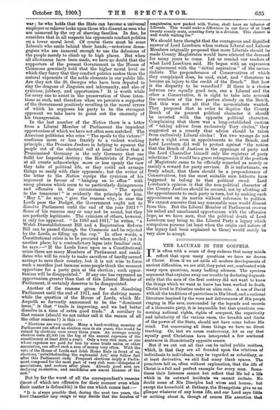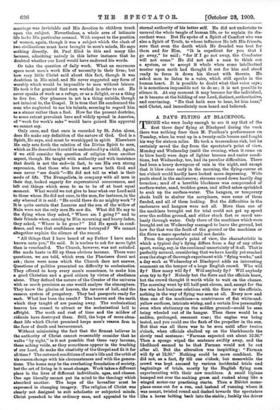THE LACUNAE IN TICE GOSPELS.
IT is often with a sense of deep sadness that many minds reflect that upon many questions we have no decree of Christ. Even if we set aside all modern developments of ancient difficulties, we are still, they point out, confronted with many open questions, many baffling silences. The specious argument that explains away our trouble by declaring dogmati- cally that the men of the first century did not want to know the things which we want to know has been worked to death. Christ lived in Palestine under an alien rule. A son of David with all the traditions of patriotism in His blood, and a national literature inspired by the woes and deliverances of His people ringing in His ears, surrounded by the legends and records of a theocratic piety, it is impossible but that questions con- cerning national rights, rights of conquest, the superiority and inferiority of the various races, the breadth and limits of the power of the State, should not have come before His mind. Yet concerning all these things we have no direct teaching. Or, lest we rouse controversy, let us say that equally good Christians have interpreted a few scattered ,sentences in diametrically opposite senses.
But if we cut out all that can be called public matters, which, in that they are all founded upon the relations of individuals to individuals, may be regarded as subsidiary, or at least derivative, we still find many blank spaces. The preachers tell us, often without explanation, that the life of Christ is a full and perfect example for every man. Some- times their listeners cannot but reflect that He led a life which in its outward incidents we cannot imitate. No doubt some of His Disciples had wives and homes; but except the household at Bethany, the Evangelists give us no glimpse whatever of any home life, and our Lord says little or nothing about it, though of course His assertion that
marriage was inviolable and His devotion to children touch upon the subject. Nevertheless, a whole area of intimate life lacks His particular counsel. With respect to the position 'of women, again, though it was a subject which the clash of two civilisations must have brought to men's minds, He says nothing directly. St. Paul filled in this and many like lacunae, admitting naively in this latter instance that he doubted whether our Lord would have endorsed his words.
Or take the question of daily work. What an enormous space most men's work fills of necessity in their lives ; but how very little Christ said about this fact, though it was doubtless in His mind, and He never suggested any form of worship which would be impossible to men without leisure. "He took it for granted that men worked in order to eat. He never speaks of work as a refuge, or as a delight, or as a thing to live for. Our pleasure in art is a thing outside, though not inimical to, the Gospel. It is true that He condemned the man who neglected to use his talents, seeming to regard him as a sinner rather than a fool. How far the present doctrine, to some extent prevalent here and widely spread in America, of "work for work's sake" would have gained His approval we cannot say.
Only once, and that once is recorded by St. John alone, does He make any definition of the nature of God. God is a Spirit, He says, and must be worshipped in spirit. Elsewhere He only sets forth the relation of the Divine Spirit to men, which as He describes it could be understood by a child. Again, if we still consider the question of religion from another aspect, though He taught with authority and with insistence that death is not the end—in fact, to use His own strong expression, that those who love and serve both God and man never "see death "—He did not tell us what is their mode of life. The Evangelists, in company with all men in their day, looked eagerly for supernatural occurrences, and left out things which seem to us to be of at least equal moment. What would we not give to hear what our Lord said to those whom He did not cure, to the men, for instance, in the city whereof it is said "He could there do no mighty work "? It is quite certain that Lazarus and the son of the widow of Nain were not the only men He saw die. What did He say to the dying when they asked, "Where am I going ?" and to their friends when, coming to Him mourning and heavy-laden, they asked, "Where is he gone " Did He speak in confi- dence, and was that confidence never betrayed ? We cannot altogether explain the silence of the record.
"All things that I have heard of my Father I have made known unto you," He said. It is useless to ask for more light than is vouchsafed. The Church, however, was not satisfied. She made haste to fill up these obvious lacunae. There were questions, we are told, which even the Pharisees durst not ask ; there were none which the Church dare not answer. Questions of politics presented no difficulty to ecclesiastics. They offered to keep every man's conscience, to make him a good Christian and a good citizen by virtue of obedience alone. They defined the nature of the Creator of the universe with as much precision as one would analyse the atmosphere. They knew the glories of heaven, the terrors of hell, and the ransom system of purgatory. They had passports ready for each. What has been the result? The heaven and the earth which they taught of are passing away. The ecclesiastical heaven has ceased to attract or the ecclesiastical hell to affright. The moth and rust of time and the mildew of ridicule have destroyed them. Still, the hope of more abun- dant life which Christ promised keeps men's reason firm in the face of death and bereavement.
Without minimising the fact that the firmest believer in the authority of Christ cannot reasonably consider that he walks "by sight," is it not possible that these very lacunae, these aching voids, as they sometimes appear in the teaching of our Lord, do make the elasticity of the Gospel and fit it for all time ? The outward conditions of man's life and the orbit of his reason change with his circumstances and with the genera- tions. The home may be the everlasting foundation of society, but the art of living in it must change. Work takes a different place in the lives of different individuals, ages, and classes. One age literally cannot put its mind to the theology which absorbed another. The hope of the hereafter must be expressed in changing imagery. The religion of Christ was clearly not designed to unit scholastic or subjected minds. Christ preached to the ordinary man, and appealed to the
eternal authority of his better self. He did not undertake to unravel the whole tangle of human life, or to explain its dis- cordant woes. But He spoke of a Spirit of Comfort who was also a Spirit of Truth, to whose influence He left His friends, sure that even the death which He dreaded was best for them and for Him. "It is expedient for you that I go away," he said ; "for if I go not away, the Comforter will not come." He did not ask a man to think out a system, or to accept it whole when some intellectual master upon earth had thought it out for him and stood ready to force it down his throat with threats. He asked men to listen to a voice, which still speaks in the human heart. It is possible to doubt what that voice says ; it is sometimes impossible not to do so ; it is not possible to silence it. At any moment it may become for the individual, as it became at the bidding of our Lord, distinct, authoritative, and convincing. "He that hath ears to hear, let him hear," said Christ, and immediately men heard and believed.











































 Previous page
Previous page